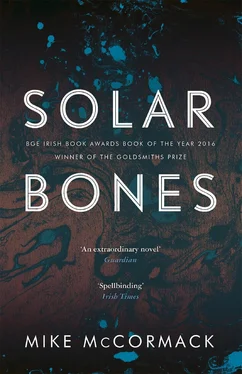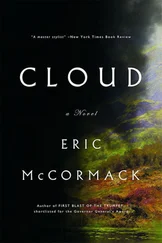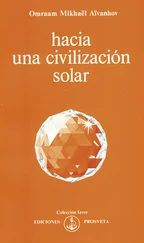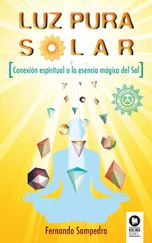whenever I close my eyes or let my attention drift I’m convinced that the whole house reverts to this kind of under-structure which supports the whole building, the roof over the exterior walls and loadbearing partitions, the weight distributed down into the foundation, the ghost neurology which upholds and haunts it, flickering just a scintilla away from pure abstraction or those originary lines lying on an architect’s drawings, the pale sheets of engineering paper on which it was conceived so that when
drifting in that state between sleep and waking it is easy to believe I inhabit a monochrome x-ray world from which I might have evaporated, flesh and bone gone, eaten up, not by any physical rot or wasting but by some metaphysical virus which devours and leaves nothing of me behind but my own heartbeat suspended in mid-air, nothing but a fat systolic contraction of the light, waiting for the dawn and the sun to shine upon it so that I might coalesce around it once more, flesh and bone and
time and again
my world come round once more so that
it took a while after Agnes and Darragh went to college for Mairead and myself to experience the house’s emptiness as a positive thing, as something other than that deserted space around us which so dismayed us in the immediate aftermath of their going away, those days in which the house hummed with such ringing vacancy we feared we might never throw off the sense of loss it brought with it, an absence which at first
Mairead felt more keenly than I, the loneliness of their empty bedrooms which were still crowded with all their teenage stuff — clothes and books and posters and CDs — things no longer needed in the new lives they had gone on to, all their bits and pieces, some of which went back to their childhood, all shelved and stacked, neat as never before but now frozen in place and there were many times in those first years after they left, when we would have welcomed again the chaos that comes with children in a house, the glad ruckus of a growing family around us, because
I know that Mairead would have welcomed a return of such chaos — the noise, their coming and going, music blaring behind bedroom doors, Darragh wandering through the house with bowls of cereal at all hours of the night — especially in the beginning when the house rang with absence, no stereos blaring, books and clothes neatly put away, a long period of adjustment needed before she eventually found herself happy in the house’s ordered space, this four-bedroom dormer, the smallest of which we shared as an office together, where I did those bits and pieces of work I brought home with me some evenings and where
Mairead prepared her classes and did whatever corrections she needed to do, sitting with her feet up on the desk and letting page after page drift to the ground around her, never tidy, something which irritated me because to walk into a room where she was working was to walk into a sort of blizzard that covered desks and floors with a clutter of paper and mugs and pens of various sorts, the floor treacherous with stray sheets of paper and those plastic sleeves that fade onto the varnished floor and are so difficult to see but which, more than once, have slid out from under my feet and nearly thrown me on the flat of my back, the whole mess grating on my nerves so that I just have to reign in my temper and tidy it all away onto the armchair and leave it there for her to sort through, make some space for myself before I can do any work and it was on one of these days, glancing up
I saw how Mairead was stalking her son’s progress across the penal colony by way of a map on the wall behind the door, a political map of all the towns and cities on the east coast from Sydney up to Brisbane, with a series of coloured pins — reds, blues and yellows — marking out Darragh’s straight-line progress as far as Brisbane where he took a hard left into the interior of Queensland, towns with names like Dalby and Toowoomba marked off — places which, for all I knew, might be nothing more than a sheep station in the middle of the desert — matter-a-dam, these were the places from where Mairead had received some sort of communication from her son so that was good enough reason for her to stab the map through the heart with one of her coloured pins, a conceit she had obviously borrowed from one of those late-night cop shows she liked to watch where world-weary detectives with broken marriages and drink problems tracked the progress of serial killers across a landscape with these same coloured pins marking out newly discovered corpses, some behavioural pattern encoded in their random distribution if only the cop stares at it long enough, a strange conceit neatly repurposed to her son’s wanderings in the outback, from hostel to campfire, sleeping under the southern cross, his period in the wilderness as he put it, his dreamtime as Agnes called it and there
on the wall beside the door, one of Agnes’s pieces, the tiny painting she gave me a couple of years ago, twenty-by-fifteen centimetres, oil on board, a little boy in short trousers and sweater standing beside a tar-barrel with a galvanised bucket on the ground beside him, the image sourced from one of my sister Eithne’s old Polaroids, hundreds of which she had lying around in boxes since her childhood, the whole stash turned over to Agnes shortly after she went to art college, the photo dating from around the same time as the disassembled tractor in the hayshed, me looking straight into the lens with an urchin’s curiosity, the image drawn up from the depths of the canvas by a flurry of brush strokes in blues and greys which centre not on the child’s eyes but on the black head of hair helmeted over the almost blank face, so much vacant space in the background and around the tar-barrel itself that the whole effect is of a plaque of light prised out of the air, its edges squared but not framed, as close as dammit to an embodied memory, because I can never look at it without feeling the weight of the galvanised bucket in my hand or hearing that sound they made whenever they were set on the ground, that scraping crash of the bottom hitting the concrete, the handle settling onto the metal rim with that clanging rattle in
this spare bedroom where one of us would work while
the other would take up the kitchen table so that the house expanded room by room around the two of us and in this new emptiness we gradually, over a period of time, learned to expand and fill it once more, returning to our proper size after the years of childrearing, gaining a clearer view of each other also and pleased to find that the house, with all its denuded spaces, shelves and cupboards, was a companionable place where a lot less needed to be said now that our children’s lives did not need to be reckoned with or organised so that we gradually arrived at a renewed closeness to each other, something of the light tenderness of our early years returning to us with a gladdening of both our spirits and
which spilled over in the kitchen a couple of times — often enough to be proud of — both of us overtaken by a passion which threw us across the room into a breathless heap, and after which we looked at each other in a blush of embarrassment, glad but uncertain at what we had just done, panting over the clothes that now lay strewn across the kitchen floor, my legs still trembling from the sudden, unaccustomed effort while Mairead laughed to find the pattern of the tablecloth imprinted on her belly, something in us revived beneath the light of the kitchen lamp but both of us wise enough to grasp the cliché of the moment and laugh at it, a moment of erotic comedy which marked what we saw in retrospect as the beginning of the second part of our marriage with its quiet renewal of our love for each other, a brightening of our new lives together which was
Читать дальше












